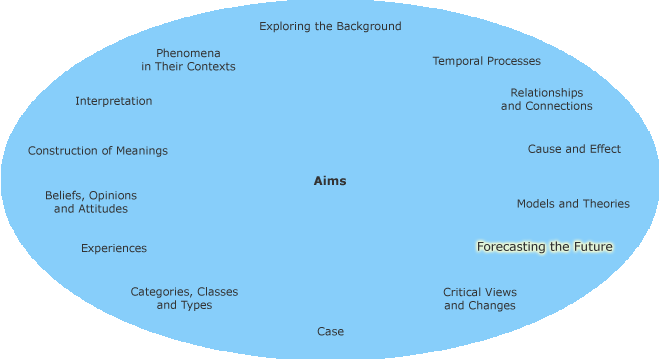Forecasting the Future
Views in humanistic research may reach to the future and as a result the researcher may present future trends in the development or change of phenomena. If you intend to direct the research interests into the future, you must base the aims of the research on exploring the phenomena or series of events both in the past and the present. Your aim is to produce reasoned forecasts of the future existence of the phenomena through an understanding of the development of the phenomena and the influencing factors on their progress from the past to the present. The focus in this type of research is usually on a socially important topic, which is significant to forecasting the future well-being of people, communities and society. The aim of this type of research may be to acknowledge the weak signals in culture and society, which ground objects and phenomena in the future.
Strategies
Research aiming to forecast the future by exploring concrete materials such as documents, interviews, images or objects can be defined as empirical research. You can use the strategy of theoretical research, when the theoretical notions of the future are formed through exploring abstract models, concepts or thoughts. Forecasting the future successfully may require a strategy of multi-method research using both qualitative and quantitative research.
In order to form a theoretical model, concept hierarchy or theoretical point of view you can use various research strategies:
Critical research enables you to formulate a critical theory.
Comparative research enables you to formulate a theory based on comparisons conducted at certain intervals.
Experimental research (the result of an experiment) enables you to formulate a theory or model.
A case study of a small group of research objects or larger group of phenomena enables you to analyse the conditions and development of the future.
Longitudinal research enables you to explore the development and change of phenomena over a long period of time.
Survey research enables you to forecast the future through other people’s thoughts.
Data Collection
You can forecast future trends using various types of data. The multi-method research strategy uses documents which enable both qualitative and quantitative analysis. You can use either data collected for previous research by another researcher (existing concrete materials) or collect / produce your own data during the research process. You must be aware that an essential point in the process of selecting and producing material is that the material must offer multiple points of views concerning the research topic.
You can use a variety of research strategies: Population research is suitable when the quantity of available data on a phenomenon is small. Sampling is suitable when the quantity of available data on a phenomenon is too large for you to analyse all of it. Random sampling enables you to select a small element without bias. Purposive sampling (goal-directed sampling) enables you to select samples that match the aim of the study.
You can collect data for making forecasts on the basis of other people’s ideas of future trends through questionnaires and interviews. If you are analysing a series of events, or trends, extending from the past through to the future, you can use data collected from archives or follow-up studies.
Data Analysis
Both quantitative analysis and qualitative analysis methods are suitable for forecasting the future.
The Delphi method, a form of quantitative analysis, was developed to aid analysis of forecasts.
Causal analysis, a form of quantitative analysis, enables exploration of cause and effect relations, which may influence forecasts of the future.
Time-series analysis is a form of quantitative analysis.
Philosophy in Science
Qualitative analysis methods in the humanities are based on interpretivism. Views emphasising interpretation in the formation of meanings and subjectivity in meaning-making processes obey the idea of relativism.
Quantitative analysis methods are based on positivism, which stresses the production of knowledge through exact measurements and use of numeric variables. Views emphasising the exactness and correctness of measured knowledge are based on realism, which views knowledge as objective.
Pragmatism based research may be necessary if the forecast aims to promote and advance a change of conditions or a series of events. Hermeneutics based research may be required if the forecast requires making various interpretations from the data.

